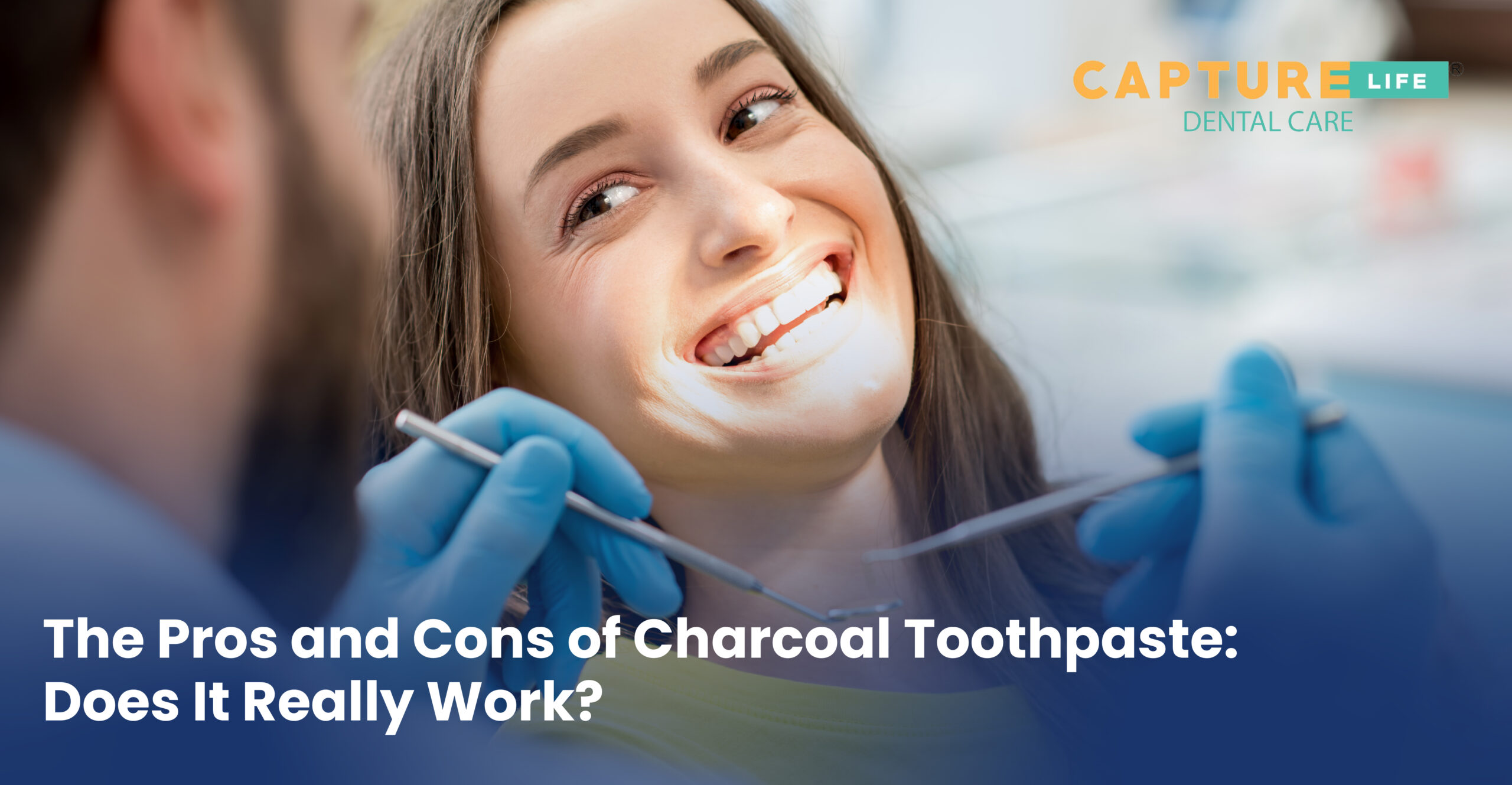
17 Jan Should You Use Charcoal Toothpaste? Pros, Cons, and Recommendations
Charcoal toothpaste has become a popular trend in the dental care industry, often touted for its whitening properties and natural ingredients. But does it really work? And is it safe for your teeth? At Capture Life Dental Care, we understand that choosing the right toothpaste for your oral health can be overwhelming, with so many options available. In this blog, we’ll break down the pros and cons of charcoal toothpaste to help you decide if it’s the right choice for your smile.
What Is Charcoal Toothpaste?
Charcoal toothpaste is a type of toothpaste that contains activated charcoal, which is often derived from coconut shells, wood, or other natural materials.
Activated charcoal is known for its absorbent properties and is used in a variety of health and beauty products, including toothpaste, to remove impurities and toxins.
The main appeal of charcoal toothpaste lies in its ability to whiten teeth and freshen breath, but it’s important to understand both the benefits and potential drawbacks.
Pros of Charcoal Toothpaste
1. Whitening Effect
One of the main reasons people choose charcoal toothpaste is its ability to whiten teeth. The activated charcoal particles in the toothpaste work to remove surface stains caused by food, drinks, and smoking. This gives your teeth a whiter appearance and can help enhance your smile.
Why It’s Beneficial:
If you’re looking for a natural alternative to chemical whitening agents, charcoal toothpaste can provide a gentler way to whiten your teeth. It can help with surface stains without causing sensitivity.
2. Absorbs Toxins and Impurities
Activated charcoal has powerful adsorptive properties, meaning it binds to impurities and toxins, helping to eliminate them from your mouth. This makes it an effective agent for improving oral hygiene by potentially reducing bacteria and bad breath.
Why It’s Beneficial:
Charcoal toothpaste can leave your mouth feeling fresh and clean by removing harmful particles. It may also contribute to healthier gums and fresher breath.
3. Natural Ingredients
Many charcoal toothpastes contain natural ingredients, which appeal to people looking for more eco-friendly and chemical-free oral care options. For those who prefer to avoid synthetic additives or fluoride, charcoal toothpaste offers a more natural alternative.
Why It’s Beneficial:
For individuals with sensitivities or those who prefer a more natural approach to dental care, charcoal toothpaste can be a great option for daily brushing.
4. Helps Remove Plaque
The gritty texture of charcoal toothpaste helps scrub away plaque and debris from your teeth. This physical cleaning action can help keep your teeth free from plaque buildup, which can lead to cavities and gum disease.
Why It’s Beneficial:
A cleaner mouth means fewer chances of developing gum issues, tooth decay, or bad breath.
Cons of Charcoal Toothpaste
1. Abrasiveness May Damage Enamel
While the abrasiveness of charcoal toothpaste helps to remove plaque and stains, it can also be too harsh on your enamel if used too frequently. Over time, this abrasion can wear down your tooth enamel, which is essential for protecting your teeth from decay and sensitivity.
Why It’s a Concern:
If you’re using charcoal toothpaste too often, or if it’s too abrasive for your teeth, it could lead to enamel erosion, which increases the risk of tooth sensitivity and cavities.
2. Lack of Fluoride
Many charcoal toothpastes don’t contain fluoride, which is a key ingredient in preventing cavities and strengthening enamel. Fluoride toothpaste is highly recommended by dental professionals for its cavity-fighting properties, and using a toothpaste without fluoride may not provide the same level of protection.
Why It’s a Concern:
If you rely solely on charcoal toothpaste, you might not get the full protective benefits of fluoride. It’s important to ensure your toothpaste contains fluoride or to use it alongside a fluoride rinse for optimal oral health.
3. Staining Potential
Although charcoal toothpaste is effective at removing surface stains, it can sometimes cause staining or discoloration around the edges of dental work, such as crowns, fillings, or veneers. This can affect the overall appearance of your smile, especially if you have restorative dental work.
Why It’s a Concern:
If you have dental restorations, you should be cautious about using charcoal toothpaste. The abrasive nature can lead to uneven staining or damage to your dental work over time.
4. May Not Be Effective for Deep Stains
Charcoal toothpaste is great for surface stains but is less effective on deep or intrinsic stains caused by aging, medication, or certain conditions. If you have more stubborn stains, you may need professional whitening treatments to achieve the desired results.
Why It’s a Concern:
Charcoal toothpaste may not be sufficient for more severe discoloration, and relying on it exclusively for whitening may leave you disappointed with the results.
Conclusion
Charcoal toothpaste has its benefits, including its ability to whiten teeth and provide a natural alternative to traditional toothpaste. However, it’s important to weigh these advantages against the potential drawbacks, such as enamel wear and lack of fluoride.
If you choose to use charcoal toothpaste, it’s essential to follow your dentist’s recommendations and incorporate fluoride toothpaste into your routine to protect your enamel and overall oral health.
At Capture Life Dental Care, we believe that the best way to care for your teeth is to find a toothpaste that meets your unique needs.
If you’d like to learn more about charcoal toothpaste or schedule a consultation for a professional teeth whitening treatment, contact Capture Life Dental Care today!
Let us help you achieve the bright, healthy smile you deserve!

